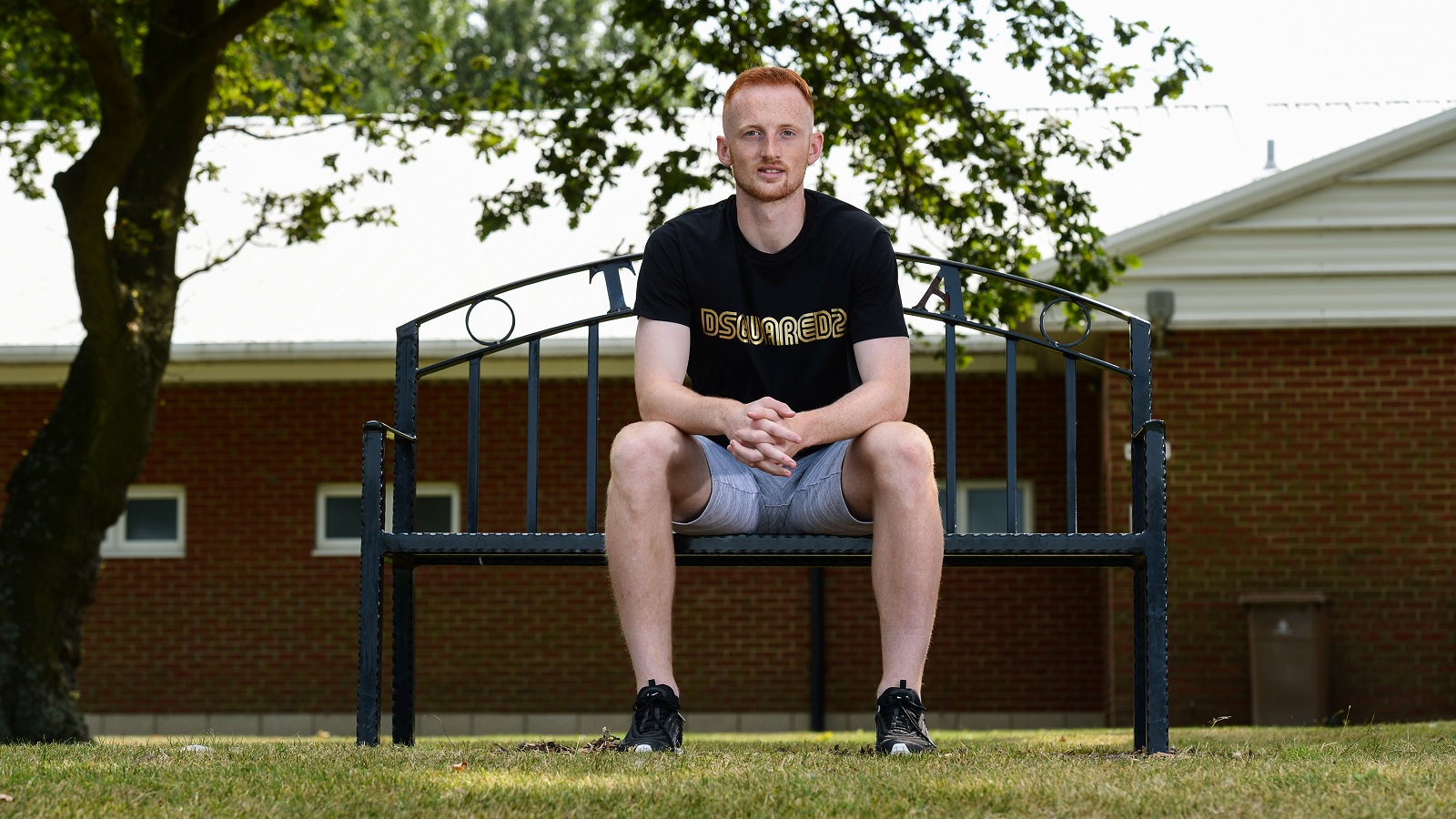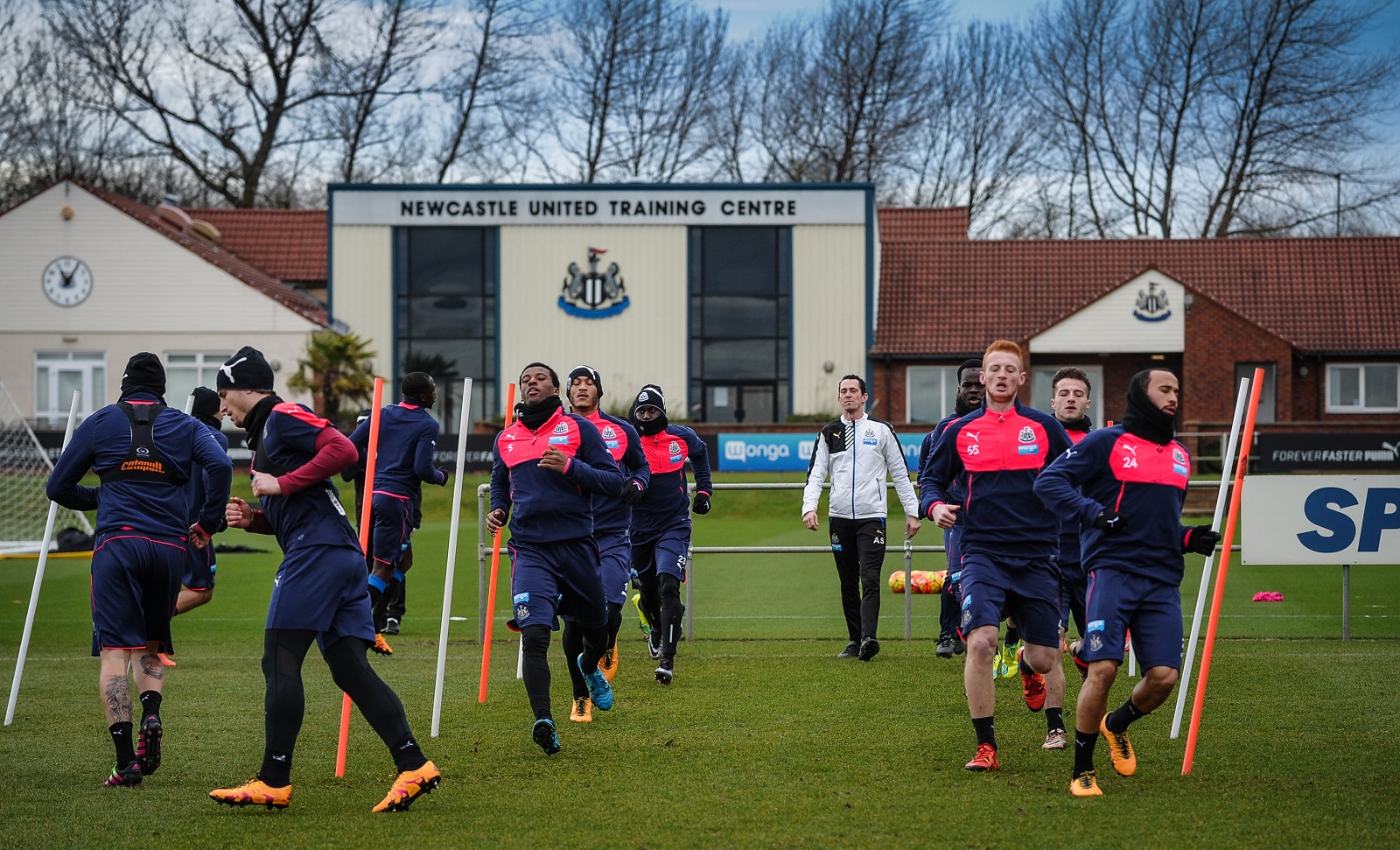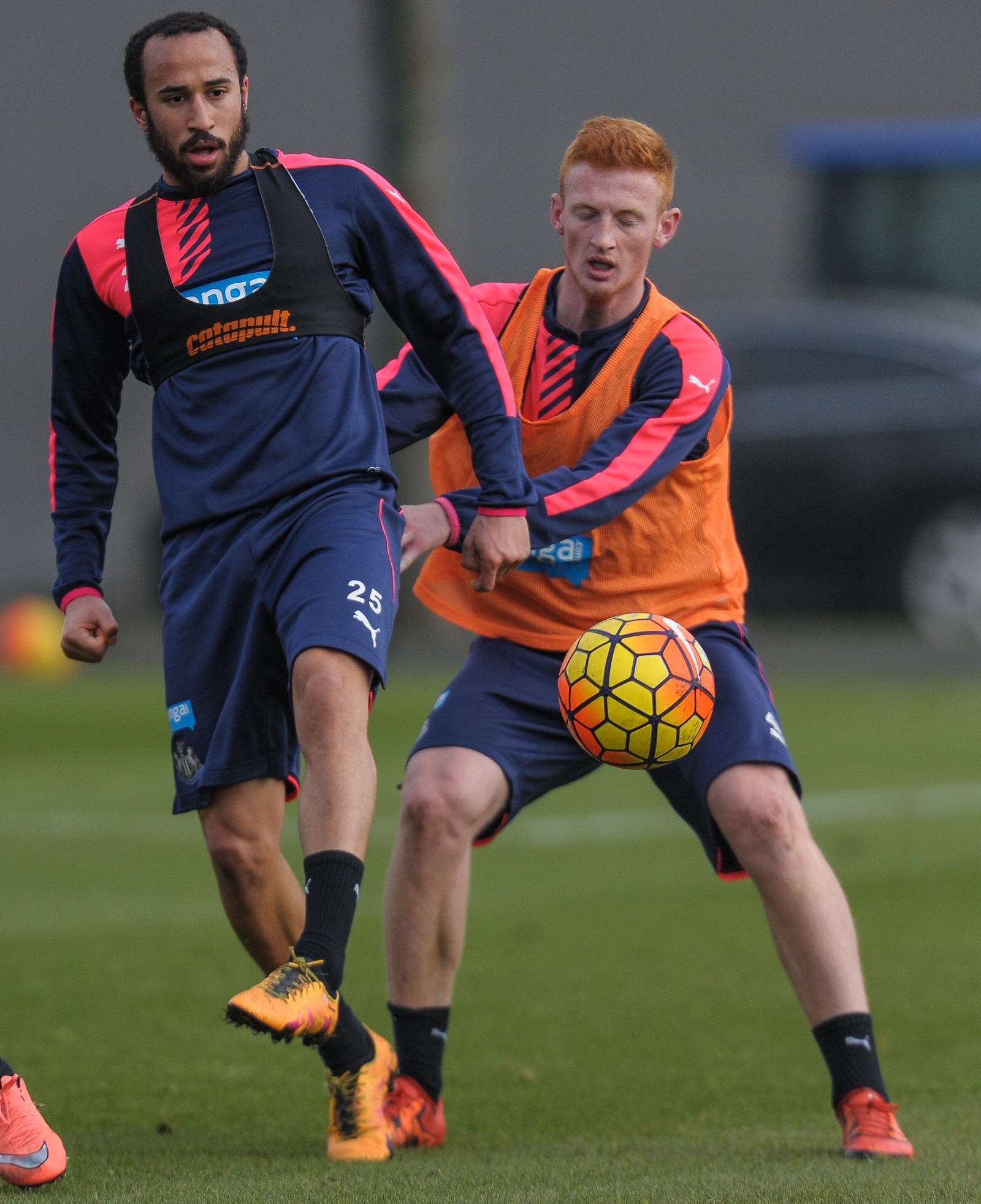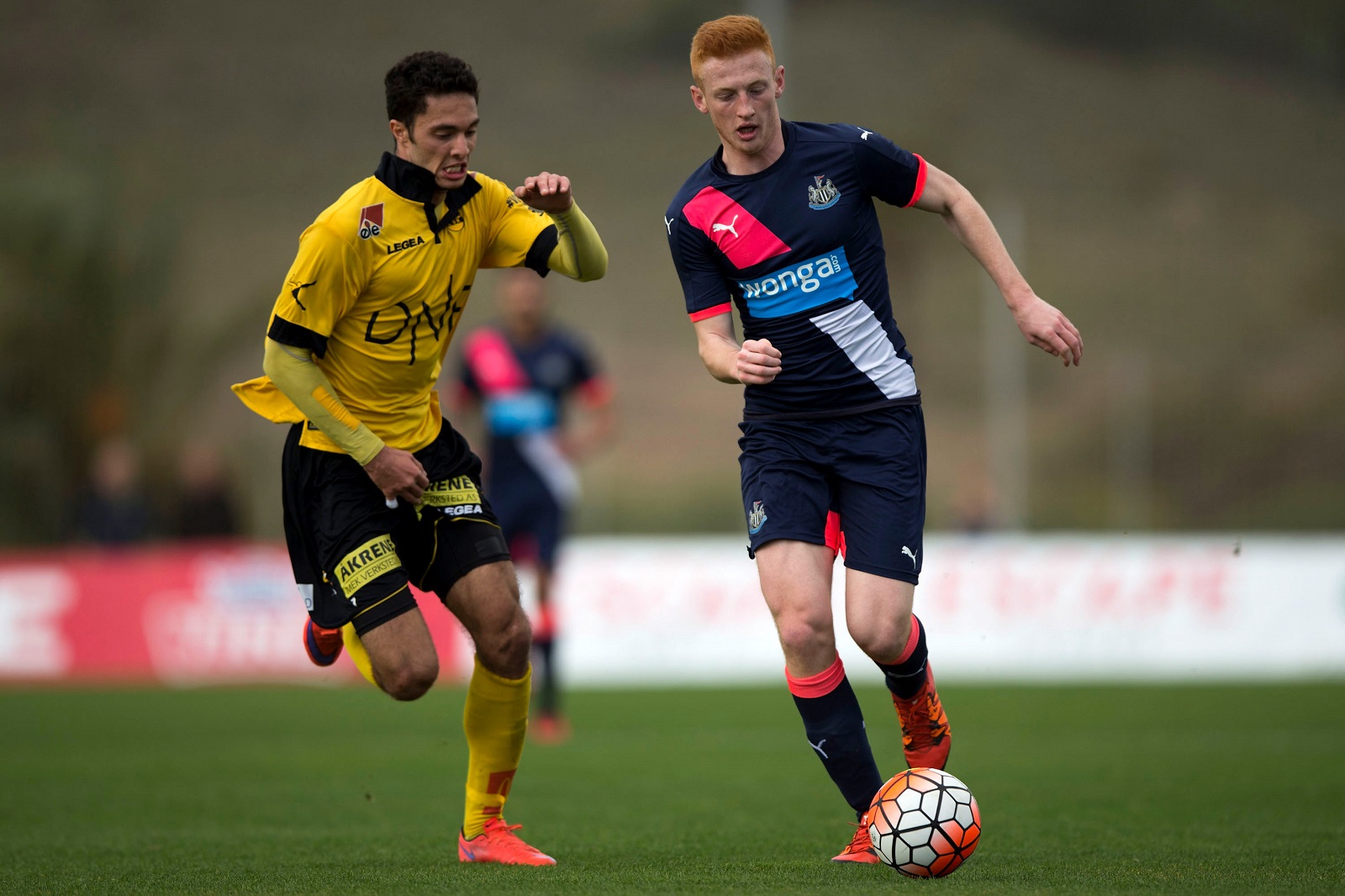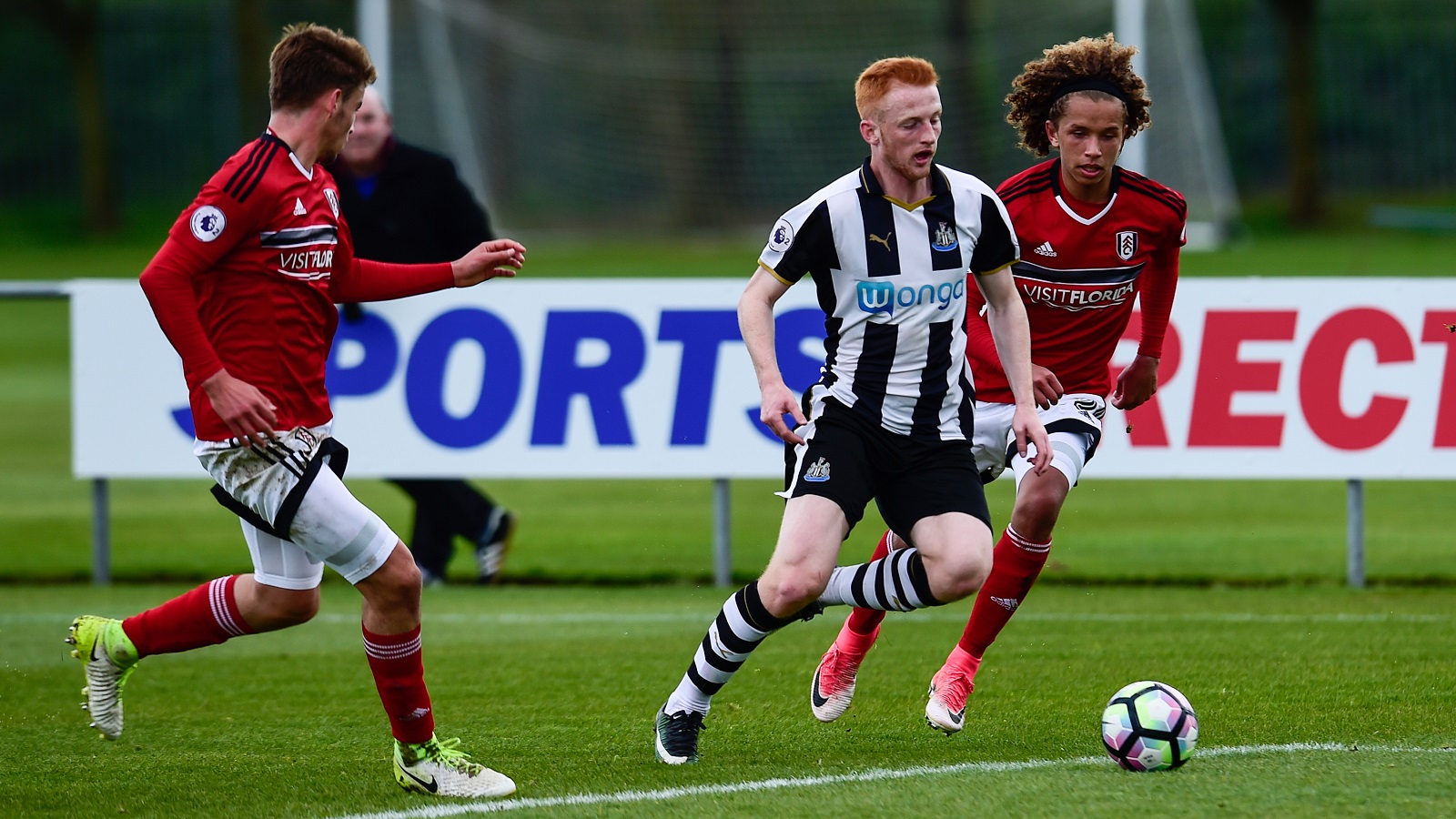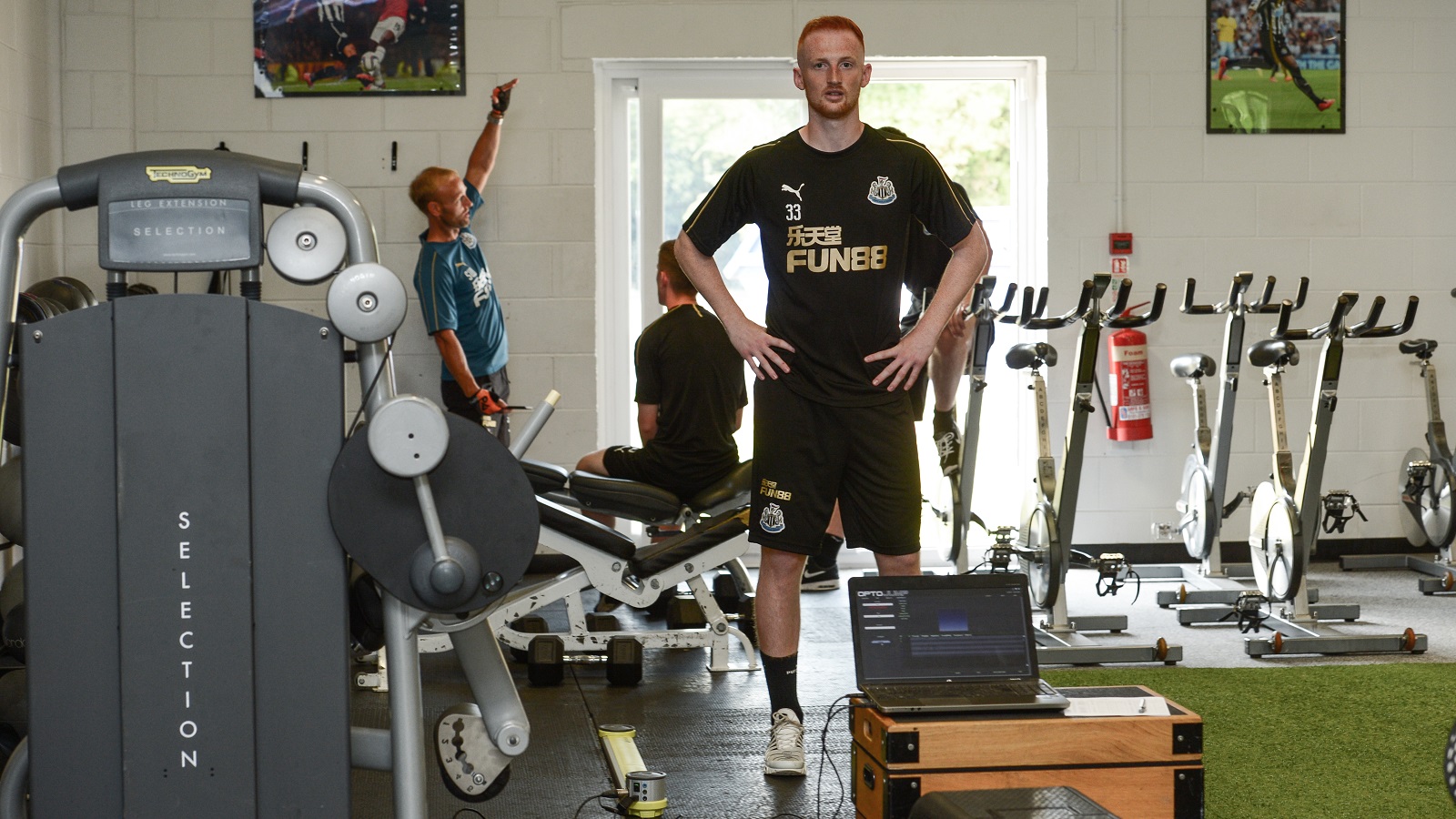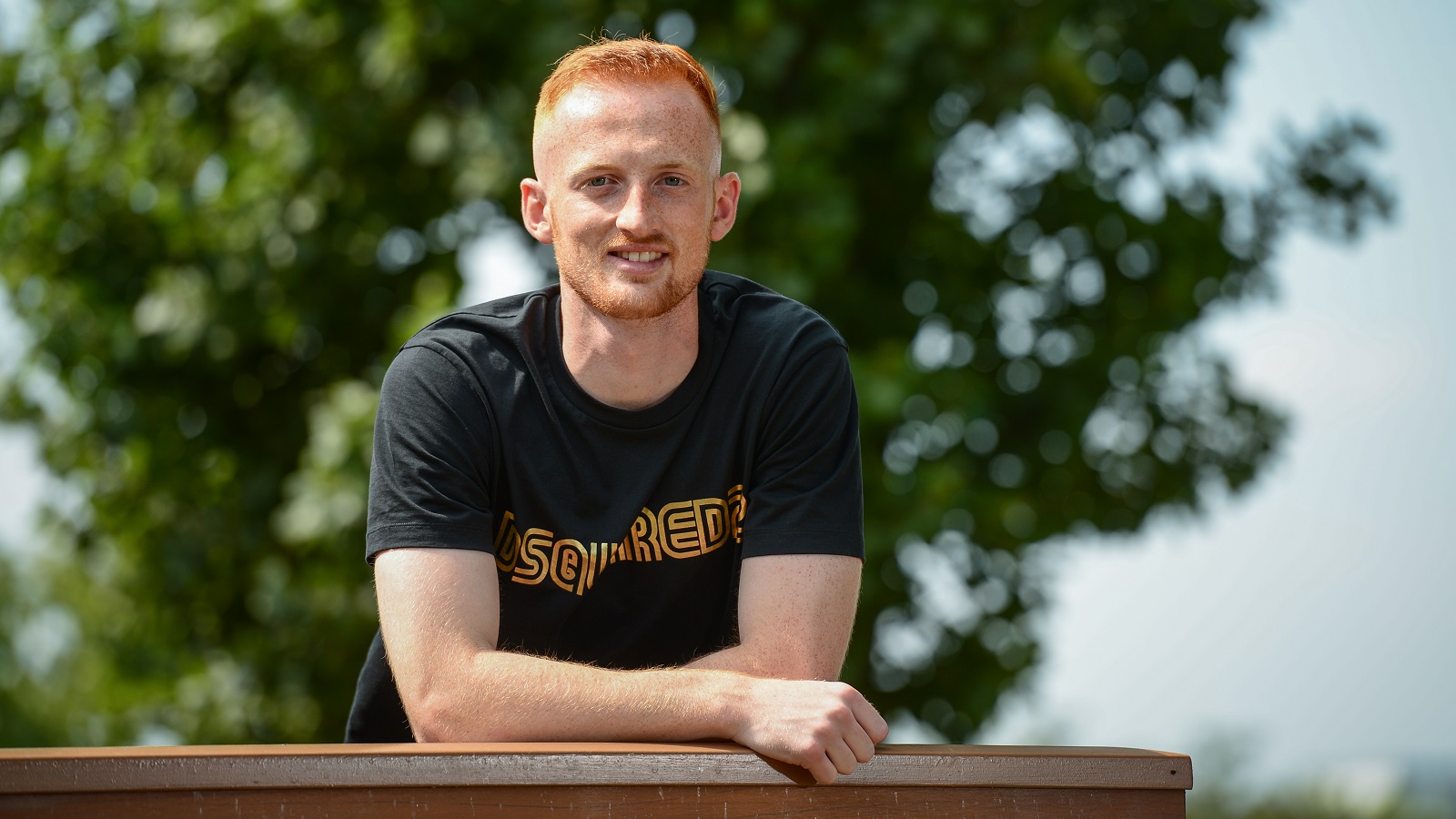Features
'To be training and playing now is kind of surreal. I just feel dead lucky' - Liam Gibson's story
Written by Tom Easterby
Liam Gibson looks lean and athletic as he takes a seat at an empty table in Newcastle United’s academy canteen. He has just finished training – a double session in the searing summer heat, followed by some gym work – and is ready to talk.
If there is any trepidation, the 21-year-old hides it well. He knows there are many harrowing memories to dredge up over the next 90 minutes. Gibson made his first appearance in a United shirt for 425 days in the under-23s’ pre-season win at Barrow last month. Where had he been, all that time?
“I was nine stone about a year ago to the day,” he says, taking a sip from the cup of tea in front of him. “If someone said you’d be back training a year today, I would have laughed at them. I was that depressed at the time, I didn’t even want to play football any more. I was saying to my parents, my girlfriend and my brother, ‘that’s it – I’ll never be able to recover from this’.
“To be training and playing now is kind of surreal. I just feel dead lucky.”
-
Gibson was born in Stanley, County Durham, and has been on the books of his boyhood club since the age of 11. For some time now, the technically-sound, strong and energetic left back has been one of the brightest talents in the club’s youth set-up. He became a regular in the under-21 side when he was just a teenager, and earned call-ups to the first team. A senior bow followed in a friendly against Lillestrom in La Manga, where he started alongside Jamaal Lascelles, Jonjo Shelvey and Gini Wijnaldum.
But Gibson pinpoints the 2014/15 season, when he was a second year scholar, as the start of it all. Still 17, he had stepped up to the second string to deputise for Shane Ferguson, and felt he was doing well.
It began that December. “I just didn’t feel right. I was training, but I felt dead tired and lethargic. I just didn’t feel myself,” he explains. “Beforehand, I was flying. I felt dead fit. It got to December and all of a sudden things changed. I was sleeping all the time – I was getting home from training and literally just sleeping. I was like, ‘this isn’t right’. It was almost a chore just to get out of bed. I was having to force myself to get up – I was that tired.”
Gibson played on for four weeks before he started to notice some more concerning signs. There was blood when he went to the toilet. “I was getting more and more tired. It was becoming basically impossible to train. I was feeling that bad. I was needing to go to the toilet ten, maybe 11 times a day.” He looked up his symptoms online and found little comfort. ‘Is this cancer?’ he thought.
After three weeks, it got worse; more blood, even less energy. Tests followed tests and in January 2015, Gibson was told he was suffering from ulcerative colitis – inflammation of the bowel, more specifically the colon and rectum. He was prescribed steroids. “I put on a vast amount of weight. My cheeks, my face just ballooned out. I think I put on about two stone. That was getting me down, as well as having to deal with the actual colitis.”
The side-effects confronted the youngster, who had been super-fit just weeks ago, with further worries. Gibson kept up appearances at the academy over the next few weeks as the club’s medical staff monitored the gradual improvement in his condition. He remembers driving home from the academy the following month when he started to feel pain his calf.
-
Gibson, third from right, in training with the Magpies first team in 2016
“As the night went on, I would never normally cry, but the pain was so bad I was in tears,” recalls Gibson. “I went home, crying in my bed, and my parents were asking me what was up. ‘My calf’s really sore, I don’t know what’s wrong with it’. It felt warm. I went to the hospital, and they thought it was just a muscle strain. At that point, in my head, I thought, ‘that’s fine – I’ll go to football tomorrow and just see the physio about it’.
“I woke up the next day and I was struggling to walk. I couldn’t drive. I asked my mum to drop me off at football. I got there and I asked the physio to have a look at my calf. I could see him thinking, ‘a calf strain shouldn’t be that bad’. I jumped on the bed and he had a feel of my calf. He said it was like a brick – there was no movement in it, which was very strange.”
The club doctor, Paul Catterson, ordered further investigation. A blood test hinted at a deep vein thrombosis. “And they just said, ‘you’ve got a blood clot in your left calf’. I was dealing with the colitis, and I was now told I had a blood clot.”
The crutches he was given reminded him that he would have to forget about football for at least six months. He was prescribed enoxaparin to thin his blood, meaning any knocks to the head or cuts to the flesh would have had potentially serious consequences. He would inject himself every morning before coming in to the academy. “That was horrible. My whole stomach was bruised. I was like a pin cushion. I was just trying to find a bit of my stomach where I hadn’t injected myself.”
Walking unaided was the first milestone to pass. When he began to run, Gibson could feel the excess weight leadening his calves and shins. He went straight into the gym each morning, without any breakfast, to try to shift it.
The end of the season neared, but he knew he wouldn’t be fit before the summer. He went away and did his best to clear his head of the worry that spread with each piece of bad news.
-
Gibson, right, challenges Andros Townsend in training
With 2015/16 approaching, Gibson had work to do. He spent two months working with fitness coach Simon Tweddle and became accustomed to the airiness of the academy gym, where he’d go to break up running sessions.
The weight came off, and Gibson returned to action as in a 2-2 draw against West Ham at Upton Park in September 2015, coming on for the last ten minutes. A brief loan at Gateshead followed. He felt normal again.
Five months later he was named on the bench, along with fellow academy products Callum Williams and Dan Barlaser, for United’s 1-0 Premier League win over West Brom. “The first time I was on the bench, he was too,” says Barlaser, a close friend and teammate of Gibson’s since the pair were under-11s. “He was training regularly with them. He was unlucky not to make his debut.”
A non-competitive first team bow arrived later that month. Steve McClaren handed him a start in that friendly in La Manga. It capped a fine season for the 18-year-old. “That was a high – I was buzzing. I’d put all that behind me – I thought, ‘this will be it now’,” adds Gibson. “All guns blazing.”
Gibson, right, in action during his first team debut against Lillestrom in February 2016
-
That progress continued into the following campaign. Gibson was a regular for the Magpies’ under-23s throughout 2016/17, becoming a dependable presence on the left as the summer approached. “I started to feel tired again,” he says. “I was getting worried – I knew what it felt like. The symptoms came back – the blood again – so I went back to the consultant.”
He winces as he recalls that trip to the Nuffield. “They said the bowel looked in the worst condition it’s ever been in. He just said ‘the bowel looks really bad. It doesn’t look great at all’. The colitis had come back. He said, ‘I’m going to keep you in overnight, and put you on intravenous steroids. And we’ll see how you are tomorrow’.”
Gibson was given asacol, and was due to go on holiday the next day with his girlfriend, Rebekah. He really wanted to go, but sitting in that hospital bed, he knew he hadn’t improved. “I shouldn’t have gone away, but I was kind of ignorant. It had been a long season and I wanted a break away, so I went on holiday.”
The steroids usually took immediate effect, but they didn’t seem to work during that fortnight in Palma. “By the end of the holiday I was bedridden,” he says. “I just couldn’t get out of bed. I was with my girlfriend, and she wanted to do stuff, activities and things. I was just saying to her, ‘I’m in no fit state’. It was a **** holiday, really.
“I was thinking about coming home early, but in the back of my head I was worried about the plane journey. I’d been searching stuff, and I’d heard of bowels basically bursting on planes because of the pressure. I wanted to go home but I was scared to.”
Once back in the country, Gibson’s mother, Angela, wanted him to go straight back to hospital but he was reluctant; his last trip had been tough enough. Three days after landing, it was getting worse. There was no choice. His haemoglobin and inflammation markers confirmed what he had already realised. “I knew then I was really ill.”
He was kept in for a week before the surgery. “They had to mark your stomach where they were going to do the operation. They did it two days before. I was like, ‘what are they doing that for?’” The surgeon knew what would need to be done, even if Gibson didn’t. They had to remove his large bowel, which was ridden with colitis. “It was explained as straightforward as it could have been. They said it needed to be done now, or it might be too late. It’s now a matter of life and death really – it’s that bad. I either going to get it done to save my life, or let it…”
He trails off. This was the nadir. “I had a bag on, and that was probably the worst thing,” he continues. “It was depressing. Not only was I not going to be playing football, but body image – I was getting so paranoid, all the time. I was depressed, I had anxiety and stuff. That first week in hospital after the operation, I know this is extreme, but there were suicidal thoughts. I was seeing mental health people, and I literally didn’t want… I kind of wanted to end it all, kind of thing. I was that frustrated and that depressed.
“My body had changed, I was stuck in the hospital and I felt like even though everyone was around me, I felt alone at that point. I would look at Facebook on my phone and I’d see the under-23s had been playing matches here and there and training, and that put me even more down. I just wished I could have been back playing with the boys.
“When all that’s taken away from you, and physically you’ve lost so much weight, with your appearance… I just felt like a nobody. I just felt like nothing, like no one would be bothered about us any more, that that was me done.”
Gibson took his tablets – which now included antidepressants – religiously but a week later, with those clouds still gathering in his mind, a twist in his small bowel induced a week of vomiting and a further procedure was required. He dropped from 13 stone to 11 stone, and had a tube running through his nose, down his throat and into his stomach to remove bile. He could feel it, every hour of the day. He couldn’t eat, and drinking made him wretch. Two hours’ sleep a night was a luxury.
“I didn’t want to talk to anyone,” he says. “My parents, girlfriend, brother and grandma and grandad were coming in, and I would just look forward and not speak to any of them. I didn’t want to be nasty – I just wanted to be away from everyone. I wanted them there, but I didn’t want to speak.”
He is at pains to state his gratitude for the unwavering support he received from his family, but wonders about the toll it took on those closest to him, who sat alongside his gaunt frame in that hospital bed. Even surrounded by those who cared, he felt alone with his thoughts. The daily routine became exhausting; he was struggling to shower without fainting and, at one point, he collapsed and needed oxygen.
Three weeks after his first operation, he was discharged. “I just wanted to get out that much, I probably bluffed a bit that I was alright,” he says, taking a sip. “I got wheelchaired out – I couldn’t walk. I got home and was passing out all the time because I was that weak.”
Gibson in action during his final game before surgery, against Fulham in May 2017
-
“As soon as he came in, he didn’t look great,” says Owen Bailey, another member of the close-knit under-23s group, recalling his friend’s tentative first steps towards recovery. “But he just fought. You always knew, because it was him, that he’d be fine, that he’d pull through. Because he’s such a strong character.
“We tried to be there for him as much as possible and do things for him. But ultimately it’s him who has done it. He had to fight himself.”
Barlaser recalls a Christmas party, when Gibson turned up to see everyone but was clearly still suffering from the effects of the steroids. “To see him ill, as a really close friend, is not nice. But fair play to him. To recover once is magnificent, but twice – that’s fantastic. I just feel so proud of him really, and proud of what he’s done.”
“To show that much character and to come back from what he has,” adds Bailey, “I don’t think people understand how much he’s actually been through, do you know what I mean? Especially to be playing football. He’s lucky to be here. He’s come back and played football – it’s unbelievable. It just shows how strong he is and what type of person he is.”
-
Gibson was training again by Christmas 2017, with a protective belt shielding his stoma bag. “I was still doing stuff when my intestine was out of my stomach,” he laughs. “I kind of got used to it, so it wasn’t that bad anymore.”
The fog was lifting and as he approached his 21st birthday, there was a clear path forward. Still, he needed to undergo a further two operations. “I was in for three days, then out. Then six weeks after, I was in for my fourth operation, in late March. They had to take the stoma bag off, put the small intestine back in my stomach, and stitch all that up. Everything went fine. It’s horrible to describe, but yeah – I was on the up now. My confidence was high.”
The gym work was slow and gentle at first. Then came jogging, then the running, under Tweddle and physio Carl Nelson’s watch. He returned to non-contact training in April, just a month before the season’s end. He didn’t want the break to come. “But I knew I was sorted,” he says, “and I had a holiday to look forward to.”
It was a far more relaxing one than that trip to Palma. Gibson smiles. “I knew what was ahead of me a year ago today. Now I’m here, it doesn’t seem real, playing again. To be truthful, I didn’t think I would play again – I thought that was it with football, I thought that was me done and I’d have to find another route to go down. But I’m back, and I’ve never felt happier. I keep saying ‘happy’, but I don’t think there’s even a word I can use to describe this.
“I feel lucky too – these operations aren’t a success for everyone. I’m one of the lucky ones to come through it and get back to doing what I love. I wanted to be a footballer since I was young. To have that taken away from you for a year, two years… I can’t really explain how much more determined that makes you.”
-
Holker Street is not, it is fair to say, the most salubrious setting for a triumph as grand as Gibson’s. It was there, at the home of Barrow AFC, that he made his return to action as a half time substitute last month, well over a year on from his last outing in a black and white shirt.
In the dressing room afterwards, there were hugs; from his teammates, many of whom posted tributes to Gibson on social media afterwards, and from the staff, who have supported him throughout. The tears flowed when he got back home. “My parents… I could see my dad getting emotional, and he’s not an emotional person,” he says. “But I could see it in his eyes. My mam was crying for us too. They’ve been with us, they’ve experienced it all with me, every step of the way. They’ve felt what I’ve felt, my girlfriend and brother too. I can’t thank them enough.”
There was a moment in that 3-2 win which gave perspective to the last few years, and his old friend Barlaser recounts it with a playful grin. Around 30 yards from his own goal and under little pressure, Gibson turned and hit an instinctive backpass towards goalkeeper Otto Huuhtanen. It was slightly miscued, and the ball bypassed the Magpies stopper and went straight out for a corner. “I looked at him like that,” says Barlaser, raising his eyebrows, “and he’s looked at me and had a little smirk, because he knows I’d be going on about it.
“It’s that craic I missed. If someone did something in a game, or something funny happened, he was always the first person to start all the laughing off. It’s always him. He always has something to do with it.”
“I knew when it went out of play that Dan would have been laughing,” smiles Gibson. “I know it’s not really something to laugh about, but Dan knows me well and I know him well. I turned my head, and I saw him – you know when your lips start moving and you’re just about to smile and laugh? I could see his lips going. I had to have a little chuckle away at myself.”
He sounds free of worry and doubt as he laughs at his own mishap. Gibson is back now, and still only 21, with his whole career, his whole life, ahead of him. “I can’t let that get to me with what I’ve been through now,” he says. “A stray pass? What’s that compared to being in a hospital bed being told you need to get an operation now, or you’re probably going to die? And that’s the bottom line – get this done, or you’re going to die. To knock the ball out of play – it’s nothing really, is it?”
-
Liam would like to extend his heartfelt thanks to those who have helped him through his illness. He thanks his family – mother Angela, father Steven and brother Lewis – and friends, as well as his girlfriend Rebekah, for their unconditional love and support. He extends his sincere thanks to the colorectal teams at both the Freeman Hospital and the University Hospital of North Durham and the nurses who cared for him so well at both hospitals. He thanks consultant Dr Hyatt, who looked after him after his first diagnosis, and the surgeons who operated on him – Miss Grant, Mr Bain and Professor Horgan. He would also like to thank the all medical and coaching staff at Newcastle United and its academy, in particular Dr Paul Catterson, Ben Dawson, Carl Nelson and Simon Tweddle, for their help, care and support throughout his illness.
For more information about ulcerative colitis, visit crohnsandcolitis.org.uk.
